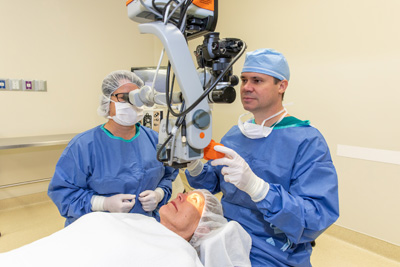
At the end of August the Food and Drug Administration announced approval of the first trifocal replacement lens for patients undergoing cataract surgery: the PanOptix lens by Alcon.
That, according to Dr. Stephan Tate at Vero Beach’s New Vision Eye Center, opens the door for dramatically improved no-glasses vision for people who have cataract surgery, but it comes with a price and possibly a couple of potential hiccups.
The PanOptix lens is “designed to provide you with clear vision for near, intermediate and far distances without glasses after cataract surgery,” according to the manufacturer. “It’s called ‘The Next-Generation Trifocal’ because it is designed to provide correction at all three distances.”
Cataract is the clouding of the natural lens inside your eye, which gradually obscures vision.
The condition is common because, as people age, the eye’s natural lens starts to get hazy or cloudy. Typically it also changes color, turning yellowish or brown over time, seriously affecting your vision.
The American Academy of Ophthalmology says “cataracts affect more than 24.4 million Americans age 40 and older, and by age 75, approximately half of all Americans have cataracts.”
The National Eye Institute at NIH claims that “by 2050, the number of people in the U.S. with cataracts is expected to double from 24.4 million to about 50 million.”
Looking at numbers like those – and before broaching the price and potential hiccups – Tate is enthusiastic about the FDA’s action.
“It was a bit of a surprise,” says Tate of the FDA greenlight for trifocal lens. “Nobody was really expecting it to be approved as quickly as it was.”
He cites two likely reasons for the swift action. First, he says, “they had very positive results in the [clinical] trials,” with the PanOptix lenses garnering a patient satisfaction rate “of approximately 99 percent.”
The second factor Tate cites is history. This particular lens, he says, is “on a platform that’s been used in probably over 100 million lens implants [in other countries], so it’s not a new lens material or a new shape of any kind and it’s known to be very, very safe.
“It is available in 70 other countries around the world and has been for several years. The FDA process is a little bit more of a drawn-out process, which is both good and bad.
“It’s bad,” Tate continues, “because sometimes we’re a little slower to get nice technology, but it’s good, in that if they do approve it, you can feel quite comfortable that it’s a safe and effective product.”
Earlier cataract replacement lenses, according to Tate, have been more like bifocal lenses that allow patients to have better distance vision and improved “up-close” vision, but leave something to be desired when it comes to intermediate range vision.
“That’s why everybody is very happy that this PanOptix lens has now been approved in the United States – because it fills in a couple of the shortcomings of the previous generation of multifocal lens implants.”
The bad news is that Medicare will not pick up the tab for the new lenses. It will cover the cataract removal procedure, but being glasses-free is something it won’t pay for.
Which means the out-of-pocket cost for these PanOptix implantable lenses, according to Tate, is in the $2,500 to $3,000 per eye range, though he quickly adds that at New Vision, “we have a whole team of insurance specialists” who will provide patients with a more precise figure based on their individual insurance coverage.
The only other potential hiccups are functional ones that Tate says can occur even with bifocal lenses – with the PanOptix lens in place, patients may see thin rings around lights at night or possibly find that, in dim light, vision is not as sharp as they would like.
Still, Tate says he is “very optimistic with this lens. Like I said, there has long been some downsides to some earlier multifocal lens options but my colleagues out of the country that I’ve spoken to and some of my partners have spoken to have all expressed a very, very high level of satisfaction with these newly approved PanOptix lenses.”
Dr. Stephen Tate is with New Vision Eye Center at 1055 37th Place in Vero Beach, directly across from the Cleveland Clinic Indian River Hospital. The phone number is 772-257-8700.



